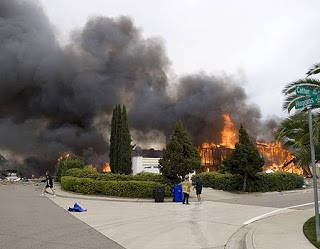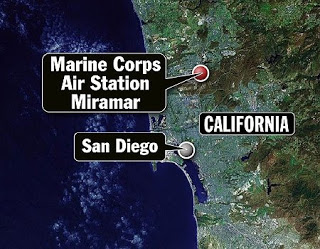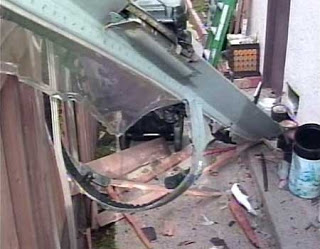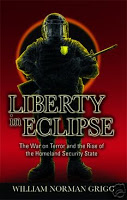Thursday, December 11, 2008
Leviathan Devours a Family
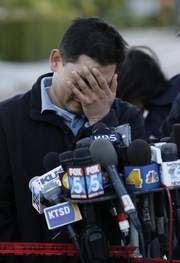
“Now there came a day when [Job’s] sons and daughters were eating and drinking wine in their oldest brother’s house; and a messenger came to Job and said … `The fire of God fell from heaven and burned up the sheep and the servants, and I alone have escaped to tell you!’… While he was yet speaking, another also came and said, `Your sons and daughters were eating and drinking wine in their oldest brother’s house, and suddenly a great wind came from across the wilderness and struck the four corners of the house, and it fell on the young people, and they are dead, and I alone have escaped to tell you….”
Job 1:13,16,18
It was neither a demonic wind nor “the fire of God” that destroyed the home of San Diego resident Dong Yun Yoon. The culprit was a crippled F/A-18 Hornet fighter jet that spiraled to the ground out of control after its pilot ejected two miles short of the runway at Miramar Air Station.
The pilot survived the experience. Yoon’s family did not. The crash destroyed his home and killed his wife, daughters, and mother-in-law, none of whom arose that morning expecting to become collateral damage in a military training exercise gone lethally wrong.
After receiving word of the tragedy, Yoon, a 37-year-old immigrant from South Korea, rushed to his home from his job at a retail store near the Mexican border – but by that time his family was gone and his home was in ashes. Like Job, Yoon was beaten to the ground by the weight of the sudden, inexplicable loss of everything he cared about.
From the depths of his misery, Job displayed astonishing stoicism. “Naked came I into the world, and naked shall I return,” he from the abyss of his misery. “The Lord gives, and the Lord takes away. Blessed be the Name of the Lord.”
Yoon likewise exhibited astonishing composure in dealing with his life-shattering loss. Referring to the pilot whose actions precipitated the loss of his family, Yoon declared: “I pray for him not to suffer for this action. I know he’s one of the treasures for our country.”
Yoon’s grief is sacred, and his capacity for forgiveness is worthy of emulation. The pilot who ditched his plane over the University City neighborhood where Yoon’s family lived certainly did not intend to hurt anybody; as he was rescued the pilot described seeing his plane hit a house, and was visibly anxious over the possibility that someone had been killed.
That young man – a Marine lieutenant in his twenties – is indeed a treasure, but for a reason other than Yoon’s remarks suggest. He is an irreplaceable human being made in the image of his Creator; he is somebody’s son, perhaps somebody’s husband and father.
The pilot’s value is a product of his humanity, not a function of the job he has chosen or the clothing he wears to work. The same can be said of Yoon’s wife, Yong Mi; his daughters, 15-month-old Grace and 2-month-old Rachel; and his mother-in-law, Suk Im Kim. Each of them was a treasure of incalculable worth.
None of these individual human lives should have ended on that morning. But if one couldn’t be spared, it was the moral duty of the pilot to sacrifice his own – assuming, of course, that there is a coherent moral code underlying the institutions of American militarism.
We are incessantly ordered to support, sustain, applaud, and pray on behalf of our “troops” – a term that encompasses pretty much any armed individual in a government-issued costume – whose “service” and “sacrifices” supposedly keep us free. It is impossible for a mind unclouded by official propaganda or poisoned by puerile sentiment to see how our supposed freedom is enhanced by the discretionary killing of distant foreigners who pose no conceivable threat to us. But the threat to life and limb posed by warplane left pilotless over a residential neighborhood is very easy to understand.
From what is presently known, the Marine pilot had been conducting a training exercise involving an at-sea landing on the USS Abraham Lincoln, which was approximately fifty miles off-shore. On his way back to Miramar, he reported that one of his plane’s engines failed. Although the plane can operate on one engine, its condition posed a risk to anyone on the ground in the flight path back to the Air Station.
This lieutenant thus confronted that rarest of things, an opportunity for a member of the US Armed Forces actually to defend the lives of American civilians. In this case, he could have done so by turning around and attempting to make it back to the Abraham Lincoln, rather than flying over a heavily populated area aboard a stricken fighter jet.
Had he done so, he may have had to ditch his plane in the ocean and die at sea. But he would have protected the civilian population, which is supposedly the reason our government has a military in the first place.
I do not mean to suggest that I wish this young man had died. Four deaths as a result of this incident are too many. I am underscoring the fact that it would be ethically perverse to suggest that the proper course of action was to sacrifice the lives of four civilians in order to save the life of a Marine.
Furthermore, it’s important to recognize that civilian pilots faced with similar crises have taken care to minimize the risk to people on the ground.
Nearly nine years ago, Alaska Airlines Flight 261 was en route from Mexico to San Francisco when the MD-83 jetliner suffered a catastrophic failure in its tail stabilizer. Owing either to poor maintenance or some bizarre accident, the jackscrew controlling the stabilizer was damaged, and this had the effect of locking it in the “full up” position – which sent the plane into a nose-first dive.
For eleven minutes, Captain Ted Thompson and First Officer William Tansky struggled to save the airliner and its 83 passengers. Displaying preternatural calm as their wounded aircraft bucked and dove, the pilots consulted with airline maintenance officials and air traffic controllers in search of an answer. They requested clearance to land at Los Angeles International Airport, specifying that they wanted to remain over the ocean as long as possible during an attempted emergency landing.
That request reflected, among other considerations, the pilots’ determination to minimize the risk to people on the ground in the event that they were unable to regain control of the jetliner. And, tragically enough, the plane eventually went into an irreversible dive, corkscrewing its way into the Pacific.
All eighty-eight people aboard that plane perished despite the genuinely heroic efforts of Thompson and Tansky to save it. A year after the tragedy, the pilots were posthumously awarded the Gold Medal for heroism from the Airline Pilots Association (ALPA), the first time that commendation had been thus awarded.
In explaining the award, ALPA executive vice president Capt. Cress Bernard explained that Thompson and Tansky had displayed “amazing grace under unbelievable pressure.” This is not just because they did what they could to save their passengers and crew, but because they had also acted to protect innocent people on the ground.
Doubtless there are some, perhaps many, military pilots who have done likewise in similar circumstances; such men are eminently worthy of respect. Mr. Yoon’s ability to forgive the pilot whose actions led to the death of his family is likewise admirable. And it shouldn’t be forgotten that the pilot had no intention to hurt anyone, and was understandably frantic over the possibility that he had.
I am very concerned, however, that Yoon’s generous gesture will help fortify an already widespread, and thoroughly pernicious, assumption – namely, that those wearing government-issued uniforms are more valuable than the population at large, and should be protected at the cost of civilian lives.
About a quarter-century ago, while reading a movie novelization by the immensely talented award-winning science fiction author Vonda McIntyre, I stumbled across the concept of Rickover’s Paradox, which was used to test the moral attitudes of officer candidates at the U.S. Naval Academy. The most famous version of this conundrum, according to McIntrye (who, when I asked her, couldn’t remember where she had encountered it), is the following:
Two individuals, the only survivors of a tragic shipwreck, are adrift in a small, damaged lifeboat. The water is pitilessly cold and infested with ravenous sharks. The boat itself is irreparably damaged in such a way that it will only be able to carry one of its occupants. If nothing is done, both occupants will perish. But whichever is cast into the sea will die very quickly.
One of those aboard the stricken lifeboat is a highly trained military officer with valuable – perhaps irreplaceable – technical skills. A huge sum has been spent on his training, which is of critical importance since the country is at war.
The other is an innocent and law-abiding person of no particular achievements or aptitudes. Few if any would notice that person’s absence, and the community at large would be impoverished in no discernible way if he were thrown overboard.
Since only one can be saved, which of the two should it be?
The only morally sound answer to this predicament is that the military officer must sacrifice himself on behalf of the civilian. That, after all, is what he was trained to do, what he had promised when he enlisted. To do otherwise would be to nullify the entire stated purpose of having a military establishment in the first place. Any other conclusion would be based on the assumption that the civilian population exists to defend the military, rather than the reverse.
Those serving the Regime under which we live regularly acts on the latter assumption in ways both great and small. Consider, for example, how frequently the behavior of police (who are now effectively part of a militarized internal security force) reflects a paramount concern for “officer safety,” even when that concern leads to the use of military tactics that leave innocent people dead.
Indeed, the fact that the Regime claims the supposed right (which remains dormant for now) to conscript people to kill and die on its behalf reflects how deeply entrenched that second assumption has become. Rather than forcing civilians to sacrifice their lives for the military, conscription forces civilians to surrender their lives to protect the State and those who control it.
In a July 13, 1863 editorial commending the Lincoln Regime for imposing the draft, the New York Times discarded the usual persiflage about conscription serving some noble purpose and described the matter with unstinting candor. Describing conscription as “a national blessing” even as a major armed insurrection against the draft raged outside, the Times demanded that Americans recognize “that our national authority has the right under the Constitution to every dollar and every right arm in the country for its protection….” (Emphasis added.)
Although we’re rarely told that our rulers assume we exist to protect them and serve their needs, that assumption is infused into the warp and weave of the Regime.
It is why the mechanism of military slavery (the so-called Selective Service System) still exists. A closely related attitude is made tangible in the ongoing peculation –through inflation, taxation, and other means – of the national wealth in order to bail out politically connected swindlers: The Regime has committed more than half of this year’s GDP toward that objective.
Dong Yoon’s gracious gesture, offered amid unfathomable grief, will almost certainly become a pseudo-patriotic proverb recited as part of the sacraments of the cult of imperial militarism: “See how nobly this young father, who came to our country in search of freedom, accepted the sacrifice required of his family in the service of that freedom!”
The unadorned truth, however, is that Yoon’s family was taken from him needlessly, killed as collateral damage in the routine operations of the Leviathan State.
On sale now
Dum spiro, pugno!
Content retrieved from: http://freedominourtime.blogspot.com/2008/12/leviathan-devours-family.html.


